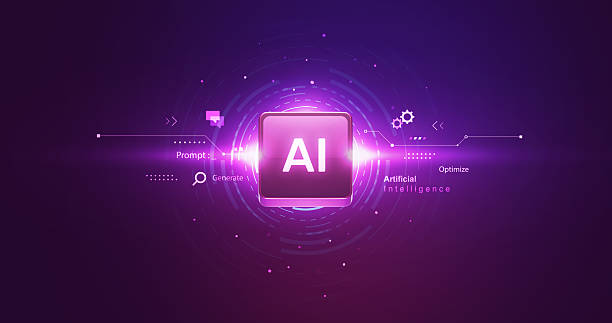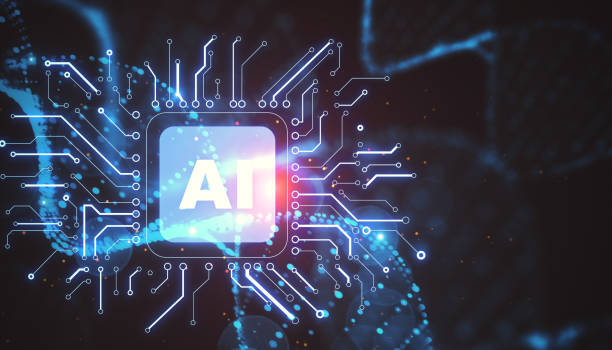What is Artificial Intelligence? Definitions and Key Concepts

#Artificial_Intelligence (AI) in short, is a branch of computer science that deals with building machines capable of performing tasks that typically require human intelligence.
These tasks include learning, problem-solving, pattern recognition, language understanding, and decision-making.
In other words, the goal of Artificial Intelligence is to create systems that can act intelligently.
AI includes diverse sub-branches, each addressing specific aspects of intelligence.
Machine Learning is one of the most important of these sub-branches, enabling machines to learn from data without explicit programming.
Deep Learning is another sub-branch that uses artificial neural networks with many layers to learn complex patterns in data.
Natural Language Processing (NLP) enables machines to understand and produce human language.
Computer Vision also allows machines to process and understand images and videos.
Expert Systems are systems that simulate the knowledge of a human expert in a specific domain and can answer questions and provide recommendations.
Artificial Intelligence is currently used in many industries and fields, including medicine, finance, transportation, manufacturing, and entertainment.
Are you tired of your e-commerce website not generating as much revenue as it could? Rasaweb, specializing in professional e-commerce website design, solves this problem forever!
✅ Increased sales rate and revenue
✅ High loading speed and unparalleled user experience
⚡ Get free e-commerce website design consultation
History of Artificial Intelligence from Beginning to Today

The history of Artificial Intelligence dates back to the 1950s.
In 1956, a conference was held at Dartmouth College, which is recognized as the official starting point of this field.
At this conference, prominent researchers such as John McCarthy, Marvin Minsky, and Claude Shannon gathered to discuss the possibility of building intelligent machines.
In the early years, AI was met with great enthusiasm, and many researchers predicted that machines would soon be able to perform all tasks that humans do.
However, progress in this field was slower than expected, and in the 1970s and 1980s, AI faced periods of stagnation known as ‘AI winters’.
During these periods, investment in the field decreased, and many projects were halted.
However, in the 1990s and 2000s, AI revived, especially with advancements in machine learning and the availability of big data.
Today, AI is rapidly advancing, and its applications are expanding into new domains.
Key recent achievements in AI include the development of self-driving cars, facial recognition systems, voice assistants, and language translation tools.
Applications of Artificial Intelligence in Various Industries

Artificial Intelligence is fundamentally transforming various industries.
In #medicine, AI is used for diagnosing diseases, developing drugs, and providing personalized care.
For example, AI systems can analyze medical images such as MRI and CT scans and detect early signs of cancer.
In the financial industry, AI is used for fraud detection, risk management, and providing financial advisory services.
In the transportation industry, self-driving cars use AI to operate without human intervention.
In the manufacturing industry, AI is used to improve productivity, reduce costs, and control quality.
In the retail industry, AI is used to provide personalized recommendations to customers, manage inventory, and enhance the shopping experience.
These are just a few examples of the widespread applications of AI across various industries.
With continuous advancements in this field, AI is expected to play an even more significant role in our daily lives.
| Industry | AI Application |
|---|---|
| Medicine | Disease diagnosis, drug development |
| Finance | Fraud detection, risk management |
| Transportation | Self-driving cars |
| Manufacturing | Productivity improvement, quality control |
Machine Learning and Its Role in AI Development

Machine learning is one of the most important sub-branches of artificial intelligence that enables machines to learn from data without explicit programming.
In fact, in machine learning, machines use various algorithms to identify patterns and relationships within data and use these patterns for prediction or decision-making.
There are different types of machine learning algorithms, including Supervised Learning, Unsupervised Learning, and Reinforcement Learning.
In supervised learning, the machine is trained using labeled data, while in unsupervised learning, the machine is trained using unlabeled data.
In reinforcement learning, the machine learns how to make the best decisions by interacting with its environment and receiving rewards or penalties.
Machine learning plays a very important role in the development of artificial intelligence.
Many of today’s advanced AI systems, such as facial recognition systems, voice assistants, and self-driving cars, use machine learning algorithms.
Does your current corporate website not reflect your brand’s credibility and power as it should? Rasaweb solves this challenge for you with professional corporate website design.
✅ Increased visitor credibility and trust
✅ Targeted attraction of more customers
⚡ Click to get free consultation!
Challenges and Limitations of Artificial Intelligence

Despite significant advancements in the field of artificial intelligence, many challenges and limitations still exist.
One of the most important challenges is the need for large amounts of data to train AI systems.
Many machine learning algorithms require vast amounts of data to be effectively trained.
Another challenge is the interpretability of AI models.
Many deep learning models, such as deep neural networks, are known as ‘black boxes’ because it is difficult to understand how these models arrive at a particular result.
This can be problematic, especially in fields like medicine and law, where transparency and explainability are required.
Another challenge is bias in data.
If the data used to train an AI system is biased, the system may also be biased.
This can lead to discrimination and inequality.
Furthermore, ethical and social issues related to AI, such as privacy, job security, and accountability, must be seriously considered.
For this reason, this technology requires an ethical review.
The Future of Artificial Intelligence and Its Impact on Human Life

The future of artificial intelligence looks very bright.
With continuous advancements in this field, AI is expected to play an even more significant role in our daily lives.
In the future, AI can help us with daily tasks, including managing finances, planning trips, and healthcare.
AI can help us make better decisions by providing accurate information and data analysis.
AI can help us solve complex problems by offering innovative and creative solutions.
However, it is important to note that AI can also pose risks.
If AI is not managed properly, it can lead to job displacement, increased inequality, and threats to privacy.
Therefore, appropriate policies and regulations must be developed to govern the use of AI to reap its benefits and prevent its risks.
Artificial Intelligence and the Creation of New Job Opportunities

While some are concerned about job losses due to automation caused by #Artificial_Intelligence, this technology actually creates new job opportunities.
These opportunities include jobs in the development and maintenance of AI systems, data analysis, and AI project management.
For example, with the increased use of machine learning, the demand for specialists who can develop, train, and deploy machine learning algorithms will increase.
Furthermore, with the increasing volume of data, the demand for specialists who can collect, process, and analyze this data will increase.
In addition, with the growing use of AI across various industries, the demand for specialists who can apply this technology in specific fields such as medicine, finance, and transportation will increase.
Therefore, investing in education and skill development related to AI can help individuals benefit from these new job opportunities.
Job opportunities are increasing day by day.
| Job Title | Job Description |
|---|---|
| Machine Learning Engineer | Develop and train machine learning algorithms |
| Data Scientist | Collect, process, and analyze data |
| AI Engineer | Design and develop AI systems |
| AI Consultant | Provide consultation on AI applications |
The Importance of Learning AI-Related Skills

Given the rapid growth of AI and its impact on various industries, learning skills related to this technology is of paramount importance.
Individuals with AI-related skills can benefit from new job opportunities, help solve complex problems, and contribute to the development of innovative technologies.
AI-related skills include technical skills such as programming, mathematics, and statistics, as well as soft skills such as problem-solving, critical thinking, and communication.
There are various ways to learn AI-related skills, including participating in online and in-person training courses, studying books and articles, and working on practical projects.
Investing in learning AI-related skills can help individuals succeed in today’s changing world.
Did you know that 85% of customers check your company’s website before any interaction?
With Rasaweb, build a corporate website worthy of your credibility.
✅ Increased customer credibility and trust
✅ Attracting high-quality leads
⚡ Get free website design consultation
Tools Used in Artificial Intelligence Development

Artificial intelligence development requires the use of various tools and libraries.
Some of the most popular tools and libraries used in this field include Python, TensorFlow, PyTorch, and Scikit-learn.
Python is a powerful and flexible programming language widely used in AI development.
TensorFlow and PyTorch are two powerful libraries for deep learning that enable the construction and training of complex neural networks.
Scikit-learn is a comprehensive library for machine learning that includes various algorithms for classification, regression, clustering, and dimensionality reduction.
In addition to these tools, other tools are used for specific tasks such as natural language processing, computer vision, and robotics.
Familiarity with these tools and libraries is essential for individuals who wish to work in the field of artificial intelligence.
The Future of Artificial Intelligence in Iran

Iran, like other countries worldwide, is increasingly paying attention to artificial intelligence.
The Iranian government has made investments in this field and has developed plans for AI development in the country.
Iranian researchers and companies are also active in various fields of artificial intelligence.
However, Iran is still lagging compared to leading countries in this field.
Challenges such as lack of investment, shortage of skilled human resources, and limitations in data access have hindered the rapid development of AI in Iran.
Nevertheless, given the country’s high potential in AI, Iran is expected to make significant progress in this field in the coming years.
Attention to AI in Iran is increasing day by day and has high potential.
Frequently Asked Questions
| Question | Answer |
|---|---|
| 1. What is Artificial Intelligence (AI)? | It is a branch of computer science that aims to create machines capable of simulating human intelligence and performing tasks that require human thinking, such as learning, problem-solving, and decision-making. |
| 2. What are the main types of Artificial Intelligence? | It can be classified into Narrow AI, which focuses on a specific task; General AI, which possesses comprehensive human capabilities; and Super AI, which surpasses human intelligence. |
| 3. Mention some common Artificial Intelligence applications in our daily lives. | These include voice assistants (such as Siri and Alexa), recommendation systems (such as Netflix and Amazon), self-driving cars, facial recognition systems, and spam filters. |
| 4. What is the difference between Artificial Intelligence and Machine Learning? | Artificial Intelligence is the broader concept of creating intelligent machines, while Machine Learning is a subset of AI that focuses on enabling systems to learn from data without explicit programming. |
| 5. What is Deep Learning? | It is a subset of Machine Learning that uses multi-layered artificial neural networks (deep neural networks) to process data and discover complex patterns, used in image and speech recognition. |
| 6. What are the main benefits of Artificial Intelligence? | Improving efficiency and productivity, automating repetitive tasks, making better decisions based on big data analysis, and developing solutions for complex problems in fields such as medicine and science. |
| 7. What are the main challenges facing the development and deployment of Artificial Intelligence? | These include the need for vast amounts of high-quality data, privacy and security issues, bias in data and algorithms, and high development and maintenance costs. |
| 8. Does Artificial Intelligence raise ethical or social concerns? | Yes, it raises concerns related to privacy, algorithmic bias, job losses due to automation, accountability for errors made by intelligent systems, and the need for a regulatory framework. |
| 9. How can Artificial Intelligence affect the future of the job market? | It can lead to the automation of some routine jobs, but it will also create new jobs that require advanced skills in developing, operating, and maintaining AI systems. |
| 10. What are some recent or promising technologies in the field of Artificial Intelligence? | These include advanced Natural Language Processing (NLP) (such as large language models like ChatGPT), computer vision, robotics, and Generative AI. |
Other advertising services from Rasaweb Advertising Agency:
- Smart Link Building: Designed for businesses seeking to increase sales through precise audience targeting.
- Smart Sales Automation: Professional optimization to increase click-through rates by optimizing key pages.
- Smart Marketing Automation: A dedicated service for increasing website traffic growth based on marketing automation.
- Smart Social Media: Professional optimization to increase sales using Google Ads management.
- Smart Brand Identity: A combination of creativity and technology to increase sales through attractive UI design.
And over hundreds of other services in the field of internet advertising, advertising consultation, and organizational solutions
Internet Advertising | Advertising Strategy | Advertorials
Sources
What is AI and how does it work?
Amazing applications of AI
The role of AI in the future
Wikipedia page: Artificial Intelligence
? With ‘Rasaweb Afarin’, your business takes flight in the digital world! From fast website design and creativity to comprehensive online marketing strategies, we are your digital success partner.
📍 Tehran, Mirdamad Street, next to Bank Markazi, Kazerun Jonubi Alley, Ramin Alley, No. 6



